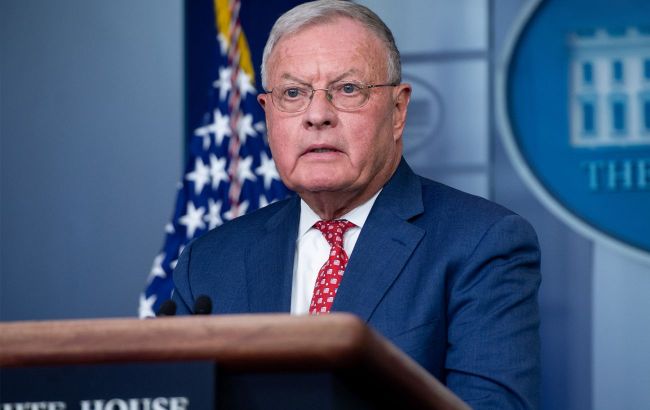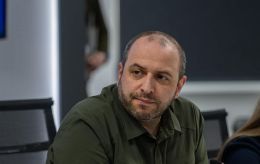Kellogg quits Trump's team: Why Kyiv is losing a crucial ally in Washington
 Keith Kellogg (photo: Getty Images)
Keith Kellogg (photo: Getty Images)
Keith Kellogg will soon leave his post as special envoy for Ukraine in Donald Trump’s administration.
RBC-Ukraine explains what he became known for and what his dismissal is connected with.
Key questions
- What did Keith Kellogg do in his position?
- What difficulties did he face because of Witkoff and Russia?
- What does replacing Kellogg with Driscoll mean?
In recent days, Donald Trump has sharply accelerated his attempts to end the Russia-Ukraine war — and he is doing it in a way that raises concerns not only in Kyiv, but also in other European capitals. Against this backdrop, an equally important process is unfolding in Washington: a change of people who shape US policy toward Ukraine.
According to Reuters, as early as January, Trump will get rid of his special envoy for Ukraine, Keith Kellogg. According to The Guardian, US Secretary of the Army Dan Driscoll will take his place.
This is much more than just a personnel rotation. It is a signal that the pro-Ukrainian flank in the White House is weakening — and for Ukraine, this may turn into very concrete problems in the near future.
Grounded in values
The 81-year-old retired general Keith Kellogg has repeatedly admitted that he lacks expertise on Russia and Ukraine. However, Kellogg has never lacked reliance on his own values, formed back in the Cold War era.
A Vietnam War veteran, in 1968, he commanded a reconnaissance platoon of the 101st Airborne Division during the Tet Offensive — one of the largest military campaigns of that war. This experience became for Kellogg a universal security formula — and through this lens, he looks at the war in Ukraine.
“The war was fought at close distance, with small arms,” he recalled in a comment for Vietnam War Commemoration, “and the unity of the unit overcame everything.”
In 1991, he was chief of staff of the 82nd Division during Operation Desert Storm, where the coalition’s lightning advance only confirmed his belief: dictators yield only to force.
These principles stayed with Kellogg when he replaced a military uniform with a business suit at the US National Security Council during Trump’s first term. There, he coordinated key foreign policy decisions regarding China, Iran, North Korea, and Russia.
On all these fronts, the results were different due to the contradictory position of President Trump. But at least Kellogg understood what to expect from Russia.
In his memoir War by Other Means, even before the full-scale invasion, Kellogg warned that Putin is step by step rebuilding the Russian empire that he inherited from the Soviet Union, using hybrid warfare to pressure neighbors without an open full-scale invasion — for now.
Soon enough, however, Putin moved to open a war against Ukraine.
On the Ukrainian track
With Trump’s return to the White House, the old general again became needed by the US president, who took a course toward ending the war. It was at this moment that a turning point began — one that was quickly felt in Kyiv. Initially, Kellogg was Trump’s envoy on Ukraine and Russia. But in the Kremlin, he encountered serious diplomatic opponents.
They could not pull the general to their side. But they knew well how to play on Trump’s psychological weaknesses. As a result, Kellogg rather quickly shifted to working only on the Ukrainian track.
Relations with Russia were taken over by the US president’s personal friend Steven Witkoff — a New York developer with no government experience. This only made Moscow’s job easier and made Ukraine’s more difficult.
Unlike other officials, Kellogg openly condemned Russia after its strikes on Ukraine. And when he came to Kyiv, and Russia temporarily paused attacks, he himself was proud of being called the "Cat,” who brings calm to Ukrainians, hinting at the similarity of his name to the domestic pet.
“When the Cat visits Ukraine, Russia stops its strikes on civilians, giving them a few nights of calm. Calm that a strong America offers to other countries,” Kellogg said on September 13.
For Kyiv, this was a signal: despite the heterogeneity of Trump’s team, Kellogg remained among the few who were not afraid to speak openly about Russian aggression.
However, in further backroom battles of Washington’s offices, Kellogg achieved only partial success. Against the backdrop of constant delays in negotiations, the key point was to convey to Trump that it is Russia that does not want to end the war. Therefore, it is Russia that must be pressured.
Kellogg generally adhered to this view, according to information Ukraine was providing to the White House. Against this background, he regularly argued with Witkoff, who openly took pro-Russian positions. As a result, Trump, for a very long time, did not impose sanctions against Russia, and only on October 22, after several months of internal disputes, agreed to the first sanctions package.
This likely negatively affected Kellogg’s desire to remain in the position. Reuters sources close to him say Kellogg was irritated by the excessive number of officials working on Ukraine and Russia and the lack of recognition that Russia is blocking the negotiations. Besides, Trump ignored Kellogg at key meetings, including the Trump-Putin summit in Alaska in August this year.
Kellogg’s resignation, according to US media, means for Kyiv the loss of a key advocate in Trump’s team. However, even with the new US special envoy, Ukraine has certain points of contact. Kellogg’s successor, Secretary of the Army Dan Driscoll, is involved in rearming the US military. And here, Ukraine can help within the framework of the drone agreement now being prepared. Among other things, Driscoll is a former classmate of US Vice President JD Vance. But in any case, the key to constructive relations with the United States must be systemic work, not reliance on individual personalities.

